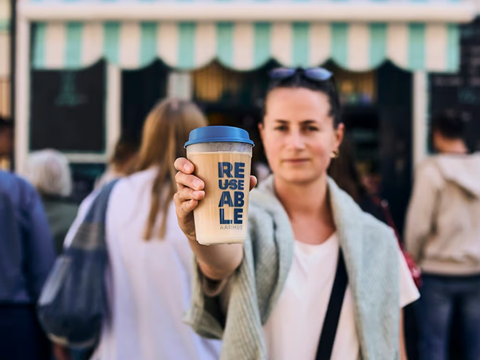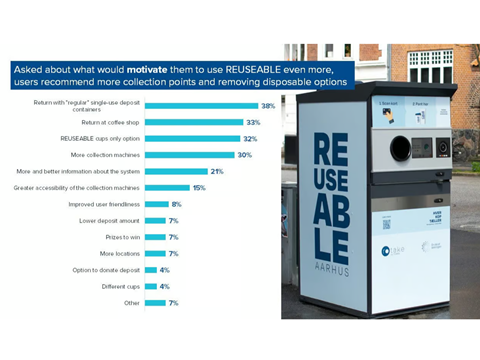
In January 2024, the city of Aarhus in Denmark launched a three-year pilot project for reusable takeaway packaging, seeking to establish a proof-of-concept to demonstrate the feasibility and benefits of shifting from single-use to reusable takeaway packaging, and the requirements for large scale development.
Created in partnership with TOMRA, the system implemented in Aarhus - branded as REUSEABLE – initially focuses on the use of reusable cups, available to consumers as an alternative option to single-use cups when purchasing takeaway drinks at cafés and quick-serve restaurants in the city. Apparently, consumers opting for a reusable cup pay an additional deposit of 5 DKK (EUR 0.67) when purchasing a beverage, and this deposit is digitally refunded to the consumer when they return the cup at one of the automated collection machines located throughout Aarhus.
After one year of operation, a survey of Aarhus residents conducted by Aarhus Municipality in conjunction with Epinion indicates that the majority of users are satisfied with the system overall. The REUSEABLE study is based on 1,039 web interviews with residents of Aarhus Municipality, collected via Epinion’s permanent panel partners.
According to TOMRA, the survey shows that residents who use REUSEABLE more than occasionally tend to be more satisfied with the system compared to citizens who have only used the system once or a few times, suggesting the added effort of returning the packaging to a collection point (compared to disposable packaging) is not in itself a hindrance to successful adoption of the system.
When asked if there were any improvements that would motivate them to use the system more, residents cited the most important factor as adding more collection machines closer to or at all establishments where the reusable cups are sold.

Reportedly, over 95,000 REUSEABLE cups were sold during the 10-day Festuge festival last summer, and by the end of the first year over 750,000 REUSEABLE cups have been returned in Aarhus, eliminating the equivalent of 7,500 waste bins of disposable cups from the city’s waste management system.
During the second year of the pilot, TOMRA plans to rollout of a new collection machine that accepts both reusable beverage cups and food packaging.
In related news, AIMPLAS announced the start of the Buddie Pack project funded by Horizon Europe this month, aiming to implement a circular system for the large-scale deployment of reusable plastic packaging. The project is anticipated to cut down the production of single-use plastic packaging, reduce water and energy consumption, and avoid the release of microplastics into the oceans.
Berry Global recently unveiled a recyclable, multi-purpose sip lid for its Reusable Cup range in an additional effort to cut down on single-use plastics while achieving high performance. Made from ‘widely recyclable’ polypropylene and intended for both reuse and reclosure, the lid is designed to be stackable, dishwasher-safe, and usable with or without a straw.
If you liked this story, you might also enjoy:
The ultimate guide to the Packaging and Packaging Waste Regulation in 2024
How are the top brands progressing on packaging sustainability?
Sustainable Innovation Report 2024: Current trends and future priorities
Everything you need to know about global plastic sustainability regulation













No comments yet